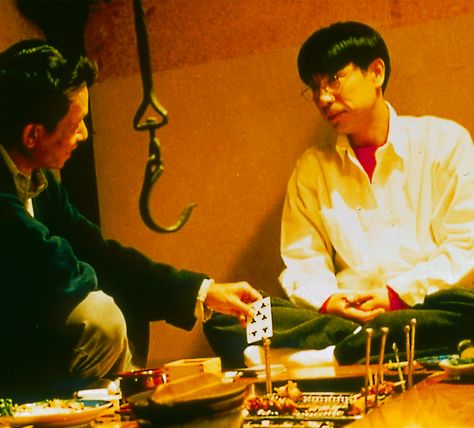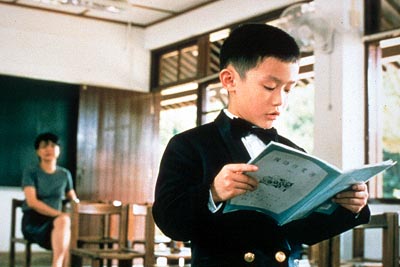Yi Yi (A One and a Two)


Sporting an epic running length but only modest ambitions, Edward Yang's Yi Yi delves deeply into the workings of a Chinese family. Yi Yi presents one of the most realistic portrayals of a believable, normal family out of all the movies released this year. It is less about a story with a beginning and an end, and more of a short glimpse into the life of a family. It is easy to see why Yi Yi has cut a swath across film festivals worldwide, winning the Best Director Award at Cannes for Yang. It takes a lot for a movie to focus so completely on characterization without relying on melodrama, and Yi Yi manages to do this.
The extended Jiang family is at the center of this movie. The family matriarch suffered a stroke, and each family member is trying to deal with the situation his or her own way. Daughter Min-Min (Elaine Jin) cannot handle the stress and temporarily retreats to a religious commune. Min-Min's husband NJ (Nien-Jen Wu, Mahjong) now must take care of the family and deal with his job, which he is becoming increasingly uninteresting. Yang (Mahjong, A Confucian Confusion) seems to introduce a catalyst in each person's life, which causes them to examine themselves closely. For NJ, it is two people; Ota (Issey Ogata) and Sherry (Su-Yun Ko). Ota is a potential client. Both NJ and Ota seem to belong in another time. They respect each other and are willing to take short-term risk to profit in the long run. NJ's business partners do not agree. Sherry is NJ's old girlfriend, who is looking to rekindle their romance.
Min-Min's brother, Ah-Di's (Hsi-Sheng Chen) marriage partially caused their mother's stroke. However, Min-Min's daughter, Ting-Ting (Kelly Lee) feels responsible. She deals with her personal turmoil internally, preferring to spend time with her new neighbor Lili (Adrian Lin). Ting-Ting's eight-year-old brother Yang-Yang (Jonathan Chang) does not quite understand everything happening around him. It sounds complicated, but Yang strives for straightforward storytelling, and takes the time to focus on each character. He also crafts full, distinct personalities for each person, fleshing out their hopes and dreams for viewers to see. Yang also uses non-actors, who are able to bring a certain realism and humanity to their roles.
Yang uses Ota and Yang-Yang, an outsider and a child, to bring to light many of the deeper truths he is trying to convey. Yang-Yang is a child, and has an innocent view of the world. He can see things that older people cannot, mainly because he has not lived through many bad experiences. He is still 'pure.' Ota is the opposite. He is older and wiser, and can look back on events critically. Many of his conversations with NJ seem almost like lessons. Yang also employs other contrasts to show the cyclical nature of life. Birth and death, a wedding and a funeral, and other opposites look superficially like a viscious circle. Everything looks inevitable and pointless, but Yang shows that there is hope present. Because Yi Yi is so introspective and character driven, it may seem boring to some people, but if they take the time, it is certainly well worth it.